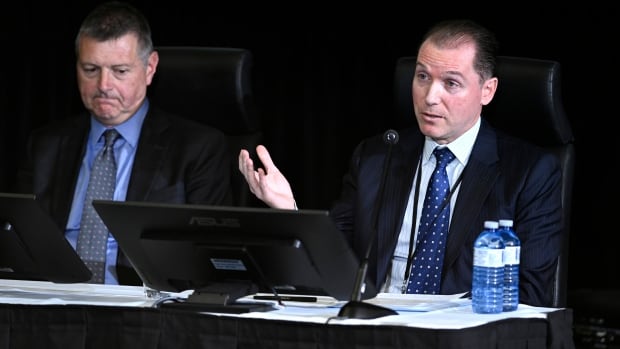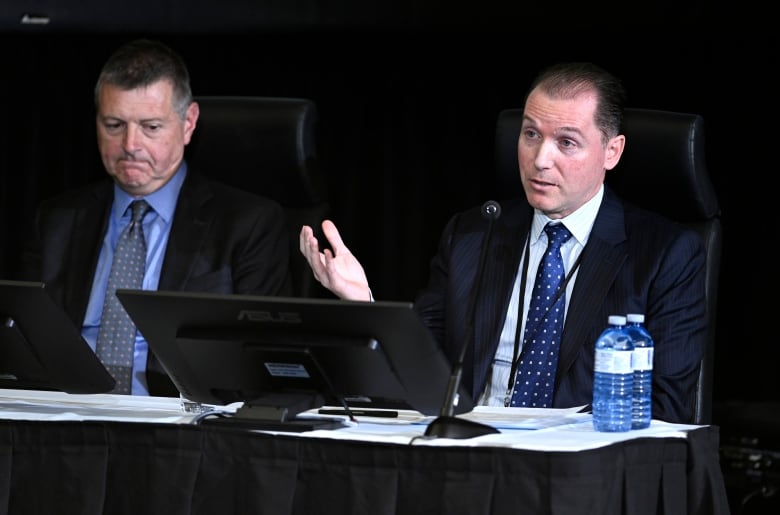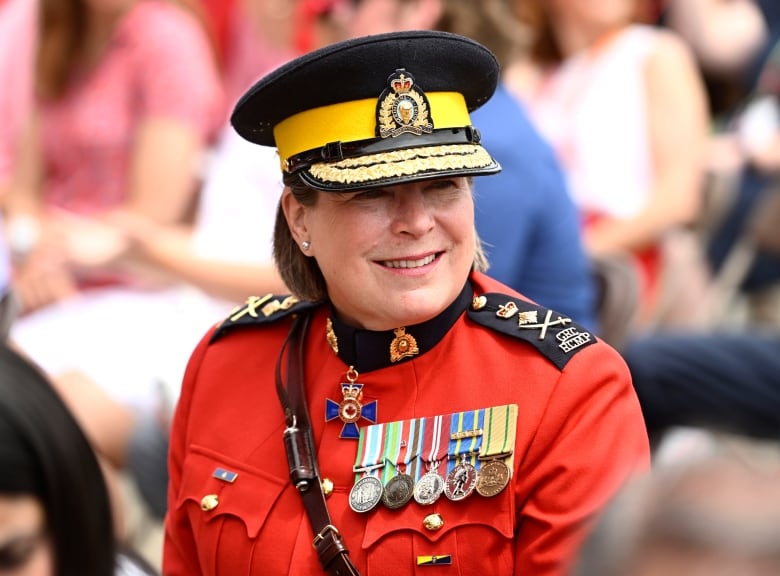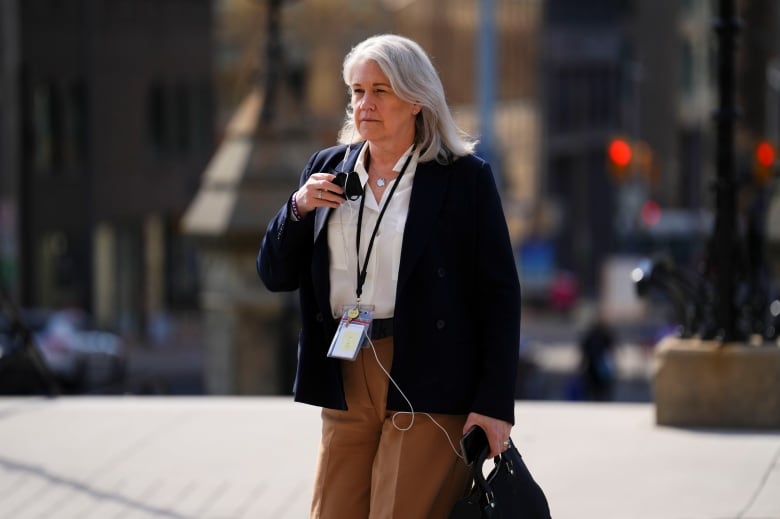
Two top public safety civil servants who were in office during last winter’s convoy protest told the Emergencies Act inquiry Monday about problems with the way intelligence was gathered and shared leading up to the protest’s first weekend.
“Intelligence is not an exact science. It’s not foolproof. Just because you have a piece of intelligence doesn’t mean you have the full picture,” Dominic Rochon, former senior assistant deputy minister of the Department of Public Safety’s national security and cyber security, told the Public Order Emergency Commission.
“It becomes a very difficult mosaic to try and pull together in terms of pulling together intelligence emanating from [the Canadian Security Intelligence Service], emanating from police forces, emanating from Canada Border Services Agency.”
The commission is reviewing whether the federal government was justified in its decision to end the protests by invoking the Emergencies Act for the first time ever. The legislation gave police new powers to break up last winter’s protests against pandemic restrictions.
Rochon said that before the convoy arrived in Ottawa, the federal department had not received any intelligence from CSIS or the RCMP warning it of the need to prepare for a significant event.
Protesters against COVID-19 restrictions used big rigs and other vehicles to block access to parts of Ottawa’s downtown for nearly three weeks.
Both Rochon and former deputy minister of Public Safety Rob Stewart sat with the commission for an interview in September. A summary of their conversation was made public Monday.
“As DM Stewart said, it is clear that they did not foresee that the convoy would be as big as it was and stay in Ottawa for as long as it did. In his view, there was an issue with information and intelligence gathering and sharing about the events,” said the document.

“The CBSA [Canada Border Services Agency] and police of jurisdiction at ports of entry did not foresee that vehicles would arrive and park on highways, ramps and bridges, and the OPS [Ottawa Police Service] did not foresee that trucks would park in downtown Ottawa for as long as they did.”
Stewart told the commission’s lawyers that law enforcement agencies — especially the RCMP — would have been “extremely reticent” to share specific intelligence about the convoy with people at the political level, according to his interview.
“The convoy highlighted that there are issues with the flow of information from law enforcement to the government,” said the summary document.
“For example, when the threats arise from ideologically motivated violent extremism (“IMVE”) rhetoric online, Public Safety and its agencies feel very under-equipped and under-prepared to gather and share intelligence about those threats and respond to them.”
‘The situation was proliferating’
Stewart told the commission’s lawyers that invoking the Emergencies Act became a real option around Feb. 11, before the blockades at border crossings in Windsor, Ont. and Coutts, Alta. were cleared.
“The situation was proliferating and made even worse by the trade implications, the reputational impacts on Canada, and the IMVE [ideologically motivated violent extremism] implications,” said his interview summary.
“There were also concerns that some of the individuals taking part in the convoy were trained security professionals and some were ex-military. It appeared as though local law enforcement could not resolve it and they were unable to enforce municipal or provincial authorities.”
Commission hearing from federal officials in final 2 weeks
Later Monday, the commission will hear from Cindy Termorshuizen, assistant deputy minister at Global Affairs Canada, and Joe Comartin, former Canadian consul general in Detroit. They are expected to reflect on how the protests affected Canada’s international relationships.
Outside of Ottawa, protesters against COVID-19 restrictions also blocked access to the border crossing in Coutts, Alta. and tied up the Ambassador Bridge, both vital commercial routes between Canada and the U.S.
Later in the week, the commission will hear from RCMP Commissioner Brenda Lucki and other Mounties.
Some of Lucki’s texts with her Ontario Provincial Police counterpart have been presented to the commission already.
In those texts, she wrote that the federal government was already losing confidence in the Ottawa police just one week into the protests.

“Between you and I only, (Government of Canada) is losing (or) lost confidence in OPS, we gotta get to safe action (or) enforcement,” Lucki texted OPP Commissioner Thomas Carrique.
“‘Cause if they go the Emergency Measures Act, you or (I) may be brought into lead, not something I want.”
Deputy Commissioner Curtis Zablocki (the top Mountie in Alberta), the RCMP’s head of federal policing Michael Duheme and former head of the Canada Border Services Agency John Ossowski are also on the witness list.
In its penultimate week, the commission will also hear from Jody Thomas, Prime Minister Justin Trudeau’s national security intelligence adviser, who has publicly defended the decision to use the act.
She told a March 10 security and defence conference that protesters were “dug in” and “there’s no doubt [they] came to overthrow the government.”

In order to declare a public order emergency, the Emergencies Act requires that there be “an emergency that arises from threats to the security of Canada that are so serious as to be a national emergency.”
Witnesses rounding out the week include:
-
Michael Keenan, deputy minister at Transport Canada.
-
Christian Dea, chief economist at Transport Canada.
-
Michael Sabia, deputy minister at the Department of Finance Canada.
-
Rhys Mendes, assistant deputy minister at the Department of Finance Canada.
-
Isabelle Jacques, assistant deputy minister at the Department of Finance Canada.
-
Jacquie Bogden, deputy secretary to the cabinet on emergency preparedness and COVID recovery.
-
Janice Charette, clerk of the Privy Council.
-
Nathalie Drouin, deputy clerk of the Privy Council
The commission finishes hearing from witnesses on Nov. 25.
Public Safety Minister Marco Mendicino, Emergency Preparedness Minister Bill Blair and Prime Minister Trudeau will all testify in the final week.